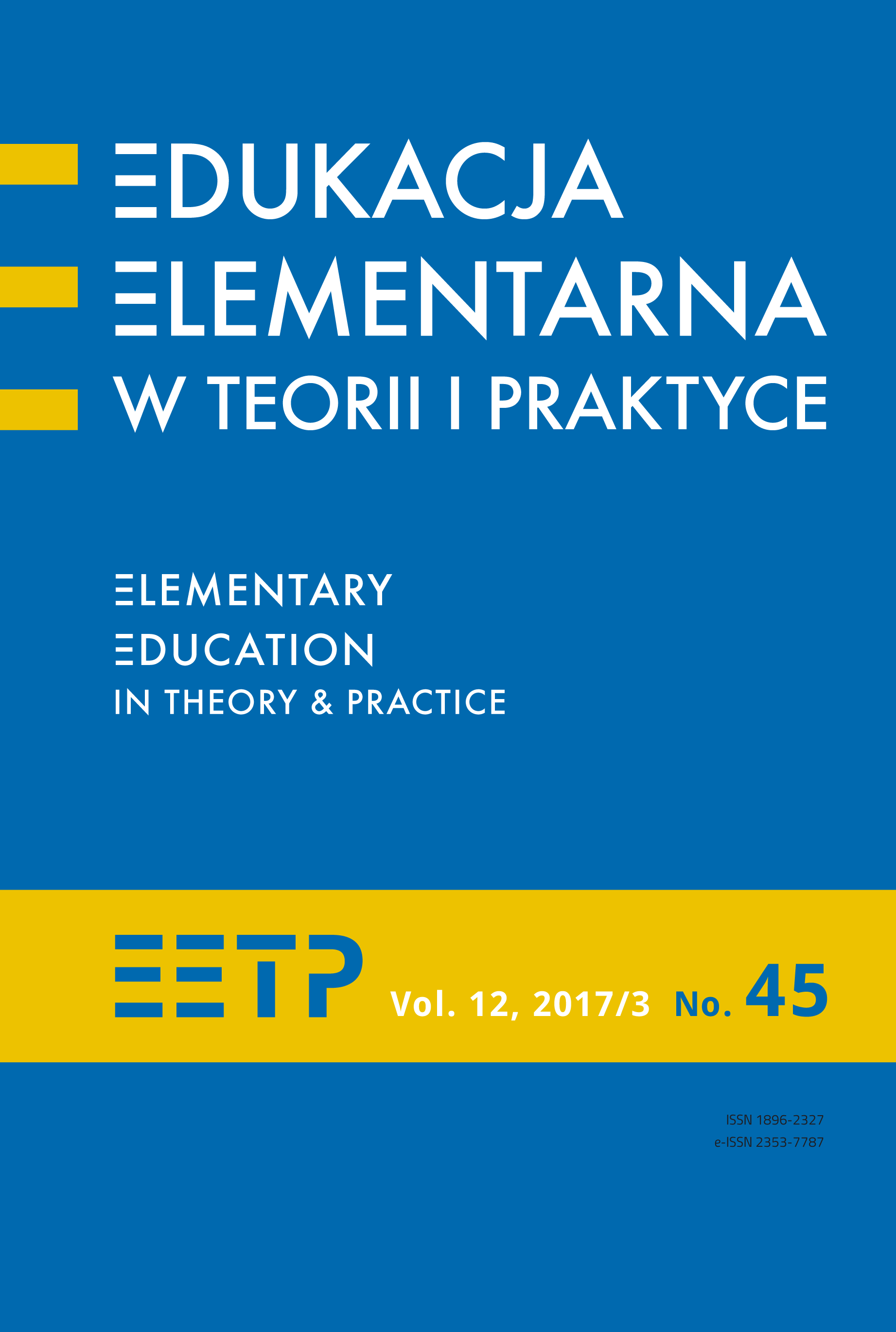Wprowadzanie dziecka w świat wartości a rola literatury dziecięcej – przykłady z praktyki pedagogicznej
Abstrakt
Potocznie mówi się, że żyjemy w czasach relatywizmu wartości, co może pociągać za sobą trudności z ich definiowaniem i stosowaniem w życiu. Podstawowym miejscem przekazywania wartości jest rodzina, jednakże przedszkole bez wątpienia ze względu na realizowane funkcje wychowawczo-dydaktyczne także wprowadza dziecko w świat wartości. Zarówno w rodzinie jak i przedszkolu w procesie kształtowania systemu wartości dziecka nie do przecenienia jest rola literatury dziecięcej, tworzonej z myślą o dzieciach i dla dzieci. W artykule przedstawiono wyniki badań, które przeprowadzono w pięciu wybranych przedszkolach samorządowych na terenie miasta Biała Podlaska Głównym celem badań było poznanie praktycznego wymiaru korzystania z literatury przez dzieci w wieku 6 lat i transmitowanych przez nią wartości. Wymieniony cel uszczegółowiono o cztery kwestie: poznanie tytułów książek posiadanych przez dzieci w domu i preferowanych przez nich pozycji literatury; poznanie ulubionego bohatera; określenie znajomości literatury przez dzieci i sytuacji, w których mają one z nią kontakt w przedszkolu. Przeprowadzone badania pokazały, że budowanie świata wartości dziecka bez literatury skierowanej z myślą o nich jest praktycznie niemożliwe.
Bibliografia
Bernacki M., Pawlus M., Słownik gatunków literackich, Wyd. Park, Bielsko-Biała 2005.
Bettelheim B., Cudowne i pożyteczne o znaczeniach i wartościach baśni, PIW,Warszawa1985.
Cieślikowski J., Wielka zabawa: folklor dziecięcy, wyobraźnia dziecka, wiersze dla dzieci, Wyd. 2, Zakład Narodowy im. Ossolińskich, Wrocław 1985.
Cieślikowski J., Literatura osobna, Wyd. Nasza Księgarnia, Warszawa1985. Cieślikowski J., Waksmund R. (red.), Literatura i podkultura dzieci i młodzieży: antologia opracowań, Wydawnictwo Uniwersytetu Wrocławskiego, Wrocław1983.
Dunin J., Książeczki dla grzecznych i niegrzecznych dzieci: z dziejów polskich publikacji dla najmłodszych, Zakład Narodowy im. Ossolińskich, Wrocław 1991.
Dymara B., Poszukiwanie ładu umysłu i serca czyli życie według wartości, [w:] Dziecko w świecie wartości, cz. II, Poszukiwanie ładu umysłu i serca, red. B. Dymara, M. Łopatkowa, Z. Pulinowa, A. Murzyn, Wyd. Impuls, Kraków 2003.
Dymara B., Ogrodzka-Mazur E., Dziecko w świecie literatury i życiu współczesnym, XXII tom serii Nauczyciele-Nauczycielom, Wyd. Impuls, Kraków 2014.
Leszczyński G., Literatura i książka dziecięca: słowo, obiegi, konteksty, Wyd. CEBID, Warszawa 2003.
Papuzińska J., Nasza mama czarodziejka, Wyd. Literatura, Warszawa 2015.
Łobocki M., Metody i techniki badań pedagogicznych, Wyd. Impuls, Kraków 2006.
Przecławska A., Czytelnictwo dzieci i młodzieży, [w:] Encyklopedia Pedagogiczna, Wyd. Literatura, Warszawa 1997.
Ratyńska H., Literatura dziecięca w pracy przedszkola, WSiP, Warszawa 1976.
Słońska I., Psychologiczne problemy ilustracji dla dzieci, Warszawa 1977.
Staroń J., Matołek Broda. Przygody twórczo-wydawnicze, „Poznańskie Studia Polonistyczne”, Seria Literacka, 26 (46), 2015.
Szulc W., Bajki nie- bajki i bajko terapia, „Życie Szkoły” nr 6/2006.
Waksmund R., Od literatury dla dzieci do literatury dziecięcej, Wyd. Zakład Narodowy im. Ossolińskich, Wrocław 2000.
Woźniak M., „Political correctness” w przekładach literatury dziecięcej. O Koziołku-Matołku i nie tylko, [w:] Prace Komisji Neofilologicznej, red. S. Gibińska-Marzec, S. Widłak, t.7,Wyd. PAU, Kraków 2008.
Copyright (c) 2017 Edukacja Elementarna w Teorii i Praktyce

Utwór dostępny jest na licencji Creative Commons Uznanie autorstwa – Bez utworów zależnych 4.0 Międzynarodowe.
1. Autor zgłaszając swój artykuł oświadcza, że jest Autorem artykułu (zwanego dalej Utworem) i:
- przysługują mu wyłączne i nieograniczone prawa autorskie do Utworu,
- jest uprawniony/a do rozporządzania prawami autorskimi do Utworu.
Oświadcza, że nie narusza praw autorskich osób trzecich i praw prawnych.
Oświadcza, że nie występuje żaden konflikt interesów.
2. Udziela Uniwersytetowi Ignatianum w Krakowie nieodpłatnej, niewyłącznej, nieograniczonej terytorialnie licencji do korzystania z Utworu na następujących polach eksploatacji:
- utrwalania utworu w formie papierowej, a także na nośniku cyfrowym lub magnetycznym;
- zwielokrotnienia utworu dowolną techniką, bez ograniczenia ilości wydań i liczby egzemplarzy;
- rozpowszechniania utworu i jego zwielokrotnionych egzemplarzy na jakimkolwiek nośniku, w tym wprowadzenia do obrotu, sprzedaży, użyczenia, najmu;
- wprowadzenia utworu do pamięci komputera;
- rozpowszechniania utworu w sieciach informatycznych, w tym w sieci Internet;
- publicznego wykonania, wystawienia, wyświetlenia, odtworzenia oraz nadawania i reemitowania, a także publicznego udostępniania utworu w taki sposób, aby każdy mógł mieć do niego dostęp w miejscu i czasie przez siebie wybranym;
- w zakresie praw zależnych do Utworu, obejmujących w szczególności prawo do dokonania koniecznych zmian w Utworze, wynikających z opracowania redakcyjnego i metodycznego, a także do dokonania tłumaczenia Utworu na języki obce.
Udzielenie licencji następuje z chwilą przekazania Utworu na rzecz Uniwersytetowi Ignatianum w Krakowie. Uniwersytet Ignatianum w Krakowie jest uprawniony do udzielania dalszych sublicencji do Utworu, w zakresie udzielonego prawa. Licencja jest ograniczona czasowo i zostaje udzielona na okres 15 lat, licząc od daty jej udzielenia.
Wyraża się zgodę i zachęca autorów do publikacji ich tekstu w Internecie (np. w repozytorium instytucji lub na jej stronie internetowej) przed lub podczas procesu składania tekstu jako, że może to prowadzić do korzystnych wymian oraz wcześniejszego i większego cytowania opublikowanego tekstu (Patrz The Effect of Open Access). Zalecamy wykorzystanie dowolnego portalu stowarzyszeń badawczych z niżej wymienionych:




